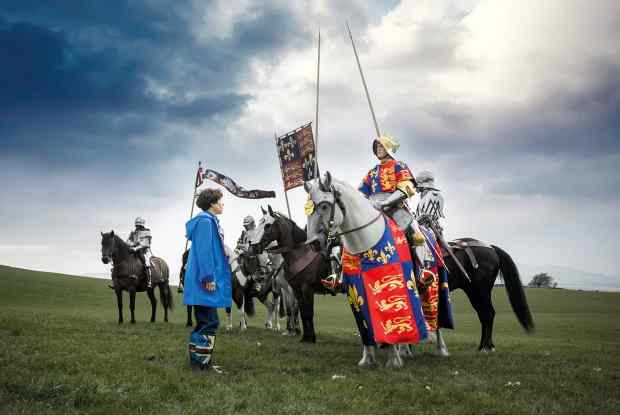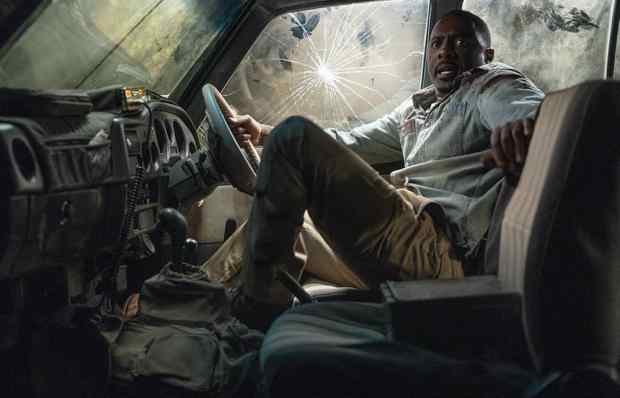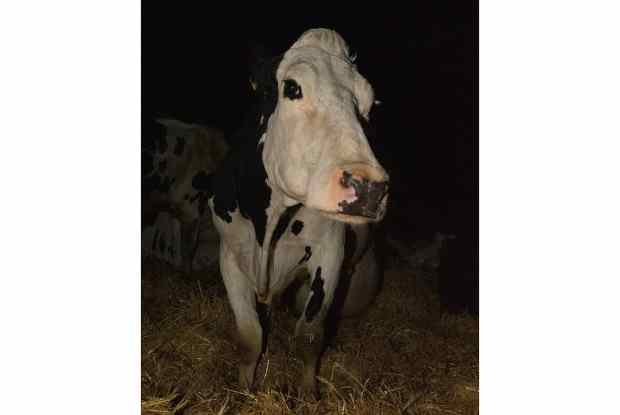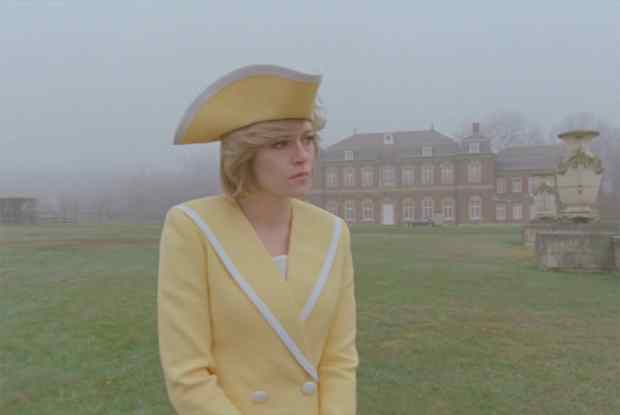Pacific Rim is a giant monsters v. giant robots film and although written and directed by Guillermo del Toro, who made Pan’s Labyrinth, which was sublime, it’s still just a giant monsters v. giant robots film, and now we have dealt with that, we can move on to The Moo Man.
The Moo Man is not like Pacific Rim. There are no giant monsters seeking to destroy the world, and no giant robots seeking to protect it. There is no CGI, no 3D, no battle scenes, no violently thumping soundtrack, no action — bar a day trip to Eastbourne — and no token woman who is feisty, as is the way with token women when the alternative might mean having to actually give them a fair crack of the whip. There is nothing about The Moo Man that takes the word ‘block’ and puts it anywhere near ‘buster’. It may even be the opposite of Pacific Rim in that, instead of being a big, noisy film with nothing to say, it’s a small, quiet film with quite a lot to say. And although there are humans in the del Toro — they pilot the giant robots from within, which may give you a clue as to what side we are expected to be on — I didn’t care about any of them, whereas I cared a great deal about Ida, who is a cow.
The Moo Man is a documentary by Andy Heathcote, an independent film-maker who spent three years with Steve Hook, who runs a small family dairy farm in Hailsham, East Sussex. Hook’s business is now a boutique business, as he sells unpasteurised milk via farmers’ markets and doorstep deliveries instead of to supermarkets, as supermarkets are only prepared to pay 27p per pint even though a pint costs 34p to produce. (The supermarkets, apparently, expect farmers to bridge the gap with working tax credits which, if I’m reading this rightly, means we, as taxpayers, are subsidising the supermarkets? Did I get that right?) If I did, this is only one of the points this film makes, and only one of the points it makes in passing. This is not a campaigning film. It’s more like a poem; with not much happening on the surface but with the power to evoke, and I was evoked.
Mr Hook is not overly sentimental about his animals — when a cow with a displaced hip has to be put down, he takes it on the chin — yet he is deeply bonded with them. There are 70 in his herd, and he knows them each by name. ‘Hello, Kate,’ he might say. ‘Hello, Matilda, hello, Emily,’ he might say, as they surge towards him for a pat on the head or a scratch behind the ears. He doesn’t have to herd his cows. They come when called. And his favourite is Ida. Ida is a 12-year-old Friesian — Steve’s cows live much longer than most cows as he doesn’t like to milk them to exhaustion — and he loves Ida just as he loved her mother, who was ‘a great cow, a lovely cow’. And Steve takes Ida to Eastbourne, for a photo-shoot to promote the deliveries, and Ida likes Eastbourne so much she refuses to return home. In the end, four big men have to get behind her huge, stubborn arse and push her into the trailer. Ida has more personality than everyone in Pacific Rim put together, and more humour — giant monsters v. giant robots is, it would seem, a serious business — and also, the most bootilicious butt in the business, and I’m including J-Lo. Plus Beyoncé, possibly.
The Moo Man is beautifully and lovingly and discreetly filmed. The seasons come and go. Calves are born. (It’s not great, if you are a bull calf, but if you are a bull calf, you are better off being a bull calf with Steve than being a bull calf with anyone else.) Steve’s family pop up; his father; his wife; his Chihuahua, Tinky; his four young sons, who marvel at dad’s new bottling plant. (More a sort of Heath Robinson set-up, but previously it was all done by hand.) Scenes are often picaresque — the cows belting towards the field after a winter of being locked in; the misty breath of a cow on a frosty morning — but never twee or picture-postcard, and always with an eye on how much Steve has to put in to make this all work. There is quite a lot of shit-shovelling, just so you know.
This quietly says what it has to say — about British agriculture; our relationship with food; the number of family farms that close every year — but mostly it’s a peculiarly moving and, somehow, emotionally satisfying portrait of a compassionate, decent man who loves his animals. But if you’re looking for a film in which entire cities are destroyed without incurring any civilian casualties? This isn’t it, although I’m sure there is something out there for you, if you look.
Got something to add? Join the discussion and comment below.
Get 10 issues for just $10
Subscribe to The Spectator Australia today for the next 10 magazine issues, plus full online access, for just $10.
You might disagree with half of it, but you’ll enjoy reading all of it. Try your first month for free, then just $2 a week for the remainder of your first year.













Comments
Don't miss out
Join the conversation with other Spectator Australia readers. Subscribe to leave a comment.
SUBSCRIBEAlready a subscriber? Log in